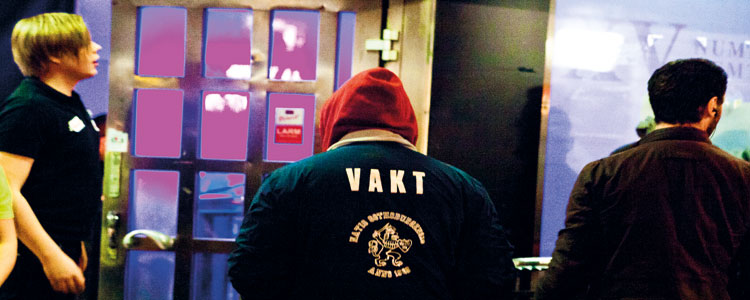Costs of tens of thousands of Swedish kronor are to be squeezed into already tight budgets. The new guard demands could have devastating effects on smaller nations.
In the future, professional guards will have to be present at the night clubs of all nations of Lund. The guards are to uphold order in student gatherings, which are no longer legally considered private.
But right now, the guards are just creating trouble.
Lundagård has been in contact with a majority of the 13 nations in Lund, and many of them are both critical and worried about the new changes.
Hits hard against smaller nations
The new changes will hit smaller nations that host clubs the hardest. These nations will now be forced to obtain a dance-permit for their activities, which means professional guards are a must.
Earlier, Blenkingska nationen has hosted many different clubs and has solved the problem of upholding order by asking volunteers to step in. Helene Andersson is the quartor of Blekingska nationen, and she thinks the demand for having guards might be costly for the nation.
“Now, we are forced to review the entirety of our organisation to rake up the money needed. Income from our club is used for cultural and sports arrangements – which might now suffer severe consequences,” she says.
Helene Andersson also thinks that the change might make the nation’s work more result-oriented than before.
“This might develop into the nation focussing more on maintaining the clubs,” she says.
READ MORE: Agreement Between Nations to Preserve Student Life
Hard to know the scope of things
The 13 nations of Lund are to send in an application about dance-permits, no later than 31 March. After that, Swedish Police will conduct an individual assessment of each nation’s club venues and problem history, to establish how many guards are needed.
Västgöta nation has appointed a committee that are to investigate possible solutions to the imminent change.
“This change will affect all nations – no matter the size. We are non-profit organisations and every penny we get is also invested in the organisation. It will take a lot of hard work to find the money that we need,” says the nation’s quartor, Jonna Restin.
Since the investigation from the police is not finished yet, she does not know what the change will entail for the nation.
“But it is clear that it will result in an economical strain, which will hit our organisation hard. Guards are more expensive than our volunteers,” she says.
Småland’s will be affected as well
The only nation not part of Kuratorskollegiet, Småland’s nation, will also be affected. Nation representative Alice Nordin thinks that the experimental club-concept of Småland’s could be set on the back burner after the change.
“It might result in our not being able to host smaller clubs as often. We might not be able to host one each Saturday, which is very sad. We want to promote a creative culture, but we do not know whether we can spend that much money on it,” she says.
“Having guards will be expensive. It is an unnecessary cost too, since we have a calm atmosphere. Guards could actually create a harsher atmosphere in our clubs,” Alice Nordin says.
But the serving permit not only limits those who have already obtained it, but also hinders those who would like to obtain one. The quartor of Kalmar’s nation, Ludvig Bodelsson, thinks that the change shuts the door completely for potential investments in clubs in the nation.
“This affects our possibility to develop our organisation in the future, establishing a club. This change shuts doors,” he says.
Translation: Richard Helander






